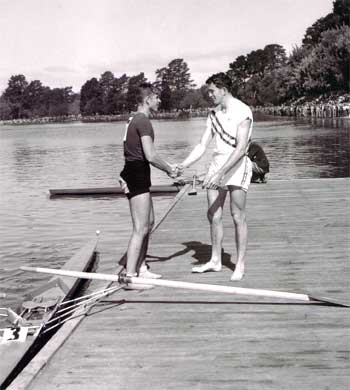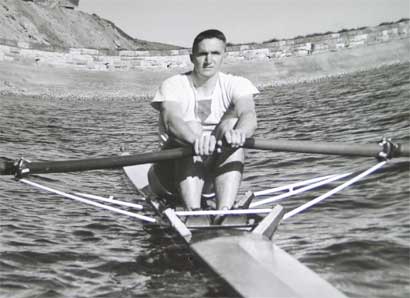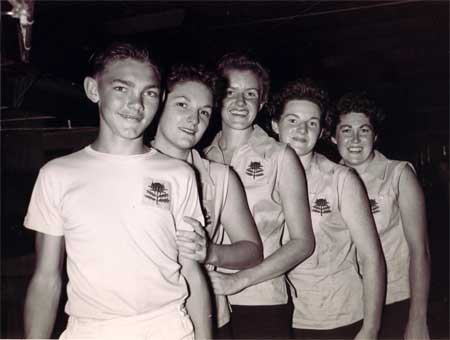History of Leichhardt Rowing Club
On these Bright Waters - A Centennial History of Leichhardt Rowing Club 1886-1986
Reproduced with permission of the author Merle Kavanagh
Table of Contents
Chapters
- The beginning
- Opening ceremony of club premises
- Early years
- 19th century social events
- Loss of the club's first shed
- Into the 20th century
- The social scene before the war
- The first world war
- Between the world wars
- The 2nd world war
- The winning years after WWII
- The struggles of the sixties and seventies
- The last decade
- Some rowing highlights
- Junior oarsmen
- Women
- Oarmanship
- Regattas and the fleet
- Some accidents and incidents
- Old boys/reunions
Appendices
- Some club personalities
- Honorary life members
- Trophies awarded
- Roll of office bearers
- Coaches and Coxswains
- Current Committee and members 1985-86
- Members of Leichhardt Old Oarsmen's Union
- NSWRA International representatives
- NSWRA Interstate representatives
- Successes in NSWRA Championships
- NSWRA Ladies Championships
- Boat race officials
- Members who served as NSWRA office bearers
11. The Winning Years After WWII
With the end of the war, the number of active members began to rise, from 15 in 1943 to 42 in 1950. In
1947 the approaches to the clubhouse were improved by the council, and this could have accounted for an
increase in vandalism at the shed. Alterations to the kitchen were made and work was
done on the staging, shutters were repaired and windows glazed. Some settlement had taken place and this was remedied.
By the end of the forties accommodation at the clubhouse was becoming inadequate and 1956 saw the completion of a new wing in memory of Chris Kayser by the Old Boys. In 1955 a Canteen was built and the W.C. completed, which had been donated by Dr. H.V. Evatt, a supporter of the club.
The Old Boys were very active, holding successful functions and presenting an Honour Roll in 1948. From money raised they donated a Regulation Four and a Racing Eight, as noted in the 1947/48 Annual Report.
In 1948 training crews were ordered to carry lights at night, due to trawling by launches. A previous problem with fishermen had occurred in 1923 when they had been netting from the pontoon and this had been reported to the appropriate department.
A club newspaper, the "Easy Oar" was inaugurated in 1949/50 and published monthly, due to the initiative of David Ward. The same year four members, Jack Lewis, Les Knight, Bill Ridley and Alan Kavanagh formed the Port Hacking Rowing Club, but unfortunately this was shortlived.
Early in 1949 the committee complained about Leichhardt being omitted from the regatta programme for the second time, so a regatta date was allocated for 5th March 1949.
In 1948 the club was reporting successes on the water. They won the N.S.W. Lightweight Four, the first Interstate Lightweight Challenge Race at Lake Wendouree, Ballarat and the N.S.W. Lightweight Champion Eight Oar Title for the first time for many years, as well as other races at various regattas.
As a further spur, in 1949 the club joined in the training methods of Professor Cotton of Sydney University, using rowing machines and other training facilities which would improve the club's results afloat. The Professor's "guinea pig" crew were narrowly beaten by an experienced Haberfield crew at Ballarat for the right to represent Australia at the 1950 Commonwealth Games at Auckland. The club reported the death of Professor Cotton with much regret in 1955/56.
The fifties saw some of Leichhardt's most successful seasons. The club won the premiership four times, including a hat trick and was runner-up four other times. In 1952/3 they reported the most successful racing season for thirty years - the Champion Eight, Champion Sculls (P.M. Evatt), Champion Lightweight Four and Maiden Four at the N.S.W. Rowing Association regatta and the Junior and Senior coxed pairs at the Henley-on-Yarra in Melbourne, the same crew winning two races at Henley being unique in Henley history to that time.

1956 Olympic Games - Mackenzie congratulates Ivanov
In 1956 five members were selected for the Olympics - Sam McKenzie (Single Sculls), David Anderson, Geoff Williamson, Peter Evatt and John Harrison (Coxless Four); five from ten selected for the Olympics from N.S.W.
Of the twelve state representatives in 1957 chosen for the King's Cup, eight were from Leichhardt - Sam McKenzie (Single Sculls), Peter Evatt, David Anderson, Vic Schweikert, Steve Roll, Ted Curtain, Lionel Robberds (Cox/Coach) and John Gray (Reserve). The club also scored a win with the Lightweight Champion Eight in Victoria and their N.S.W. Championship events included the Lightweight Champion Eight, the Lightweight Champion Four, Champion Eight, Champion Double Sculls and the Champion Four.
The following two years were Leichhardt's! Six representatives were at the Empire Games in Wales, four of the N.S.W. King's cup crew were from Leichhardt, the captain gained state selection and won the Australian Sculling Championship winning the President's Cup, the Australian composite Eight representing Leichhardt, won the Marlow Grand Challenge Cup and reached the final of the "Grand Challenge Eights" at Henley which was won by Russian club crew Trud; the club had 13 out of 19 representatives in the State Rowing Squad for Perth, Steve Roll won the Middle States Sculling Championship in the U.S.A. and the N.S.W. Eight, which was mainly a Leichhardt crew, won the King's Cup, first time since 1951, this crew having been trained by Prof. Cotton's principles. For the first year they won 8 of 11 N.S.W. Championships and for the second year they won 7 of 14 State Championships.

1958 President's Cup winner & 1958 US Middle State Sculling Champion - Steve Roll
In the 1959/60 season the club acquitted themselves quite well, winning 6 of 12 State Championships and having 11 Leichhardt men amongst the 20 representatives in the State Squad for Launceston. Four members gained selection for the Olympic Games.
Halfway through the fifties, Leichhardt boated a ladies crew comprising Hazel Horth, Barbara Thom, Pauline Thom and Doreen Addison, which did very well, winning the Australian Championship for a number of years, with Lionel Robberds as Cox, and a special Challenge Race in June 1957 against Victoria. The 1957 crew comprised Pauline Thom (str), Doreen Addison, Hazel Horth, Barbara Thom (bow) and Lionel Robberds (cox/coach). However, this group did not last long into the sixties.

1955 NSW Women's Four containing Leichhardt's Hazel Horth in the three seat and Lionel Robberds in the cox seat.
It was truly Leichhardt's decade and to cap it all off, the clubhouse was finally paid for in 1956.
The social life kept up with the successes on the water. Golf days were held, football matches, skating parties, housie nights, the Annual Balls, house parties and a CARNIVAL!
As the decade came to a close, a pair of new Ergometers were acquired, these being a vast improvement on the originals. A speedboat was also purchased for coaching purposes.
The club "lost" some good rowers from time to time owing to National Service, when selected males were required to train in the services for three months, but despite this, the club went from strength to strength.
